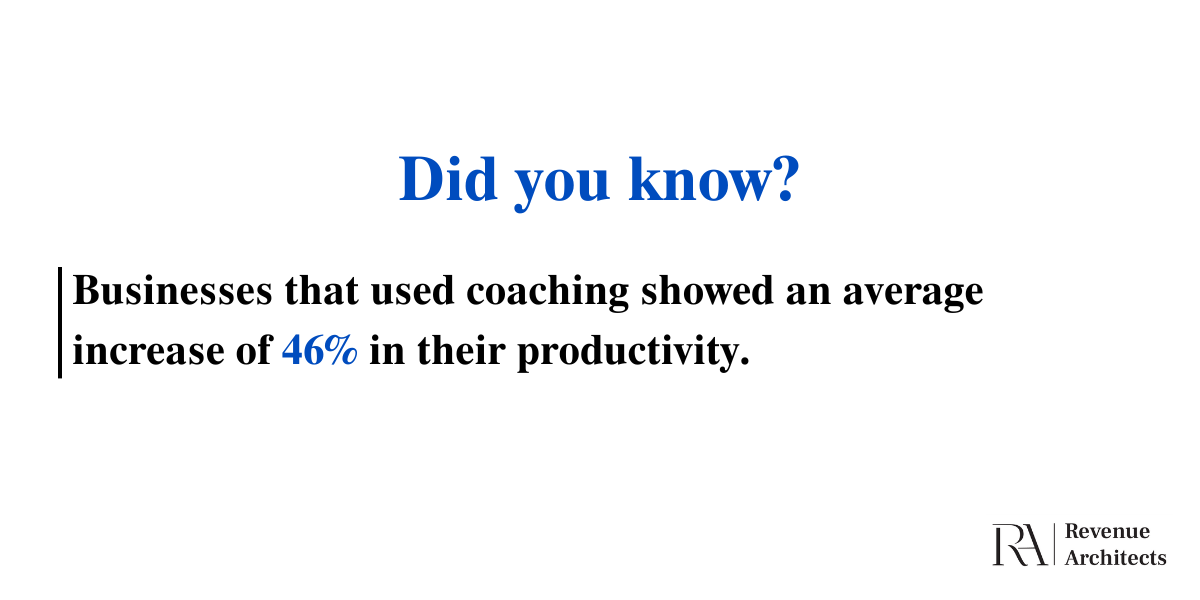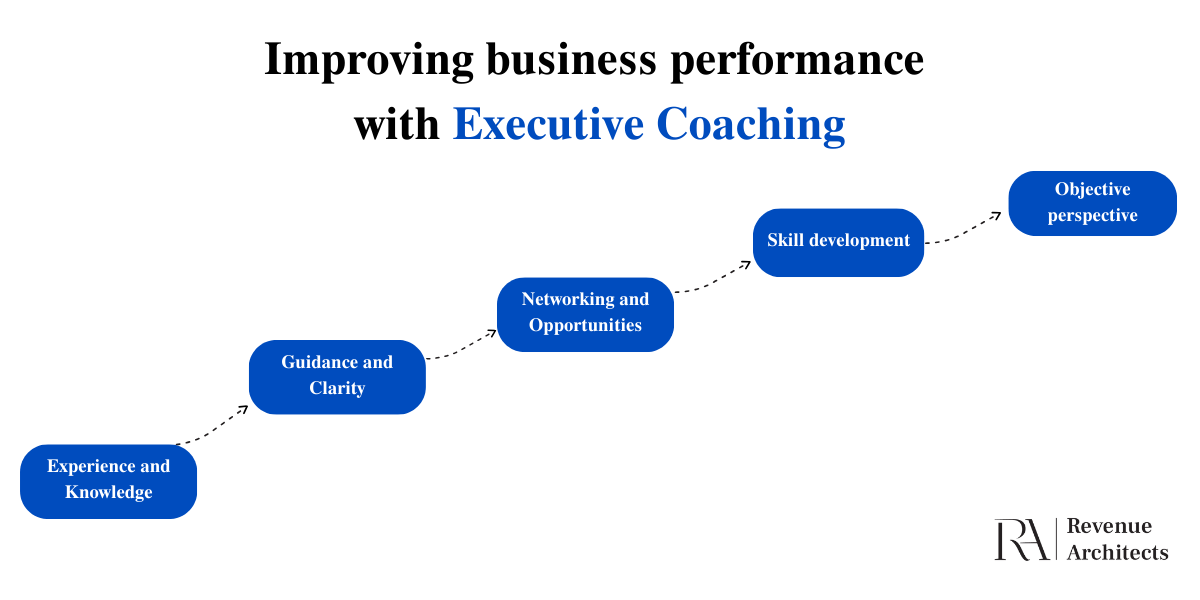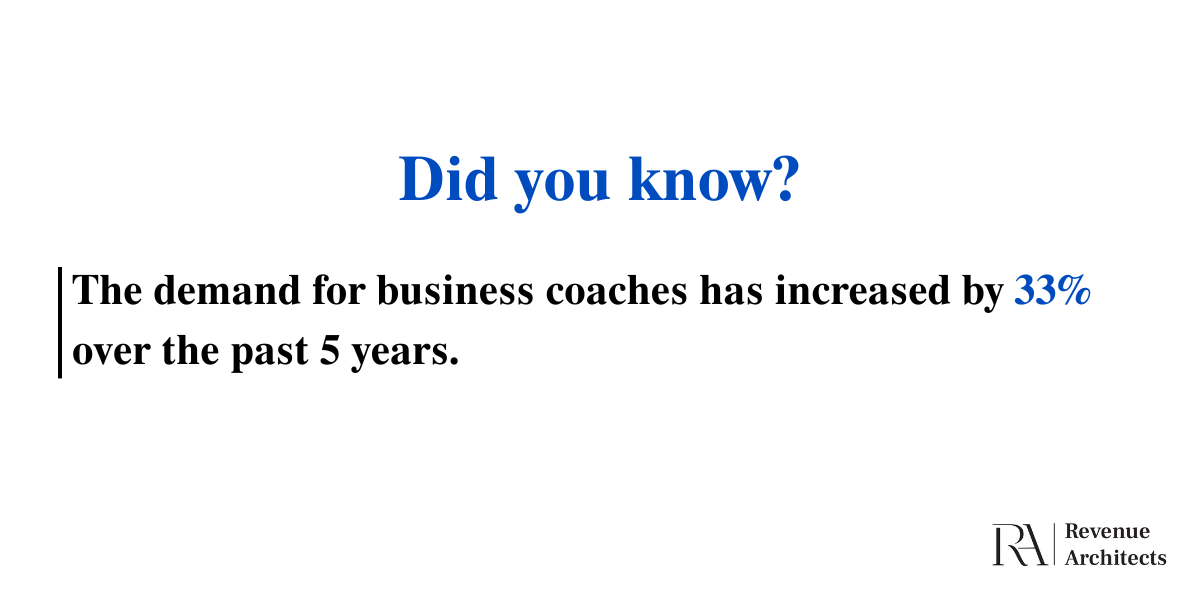In the relentless pursuit of competitive advantage, businesses today are increasingly turning to executive coaching as a catalyst for leadership excellence and organizational growth. And the numbers tell a compelling story: a staggering 89% of individuals who have undergone executive coaching report heightened job satisfaction. Even more striking is the financial impact, with the return on investment (ROI) for executive coaching calculated to be nearly six times the cost. These statistics highlight the profound influence that executive coaching can wield in shaping both individual careers and the broader business landscape.
In this article, we will unravel the impact of executive coaching on leaders and companies and show you how it differentiates from mentoring.
What is Executive Coaching?
Executive coaching empowers leaders through dialogue. The coach’s questions serve as a catalyst for the client’s transformation, enhancing their understanding of the situation and context.
This process broadens the leader’s perspective, enabling them to see things more comprehensively and deeply. It also instils a renewed motivation and energy to apply new tools and methods learned during coaching.
As a result, the leader’s behaviour changes, and their effectiveness increases, giving them a sense of control and capability.
Executive coaching can be a proactive step taken by leaders themselves, who directly approach a coach, or it can be initiated by higher management. In the latter case, where a third party is the client, the first meeting occurs in a tripartite format (the client—higher management, the leader—the coachee, and the coach). The coach gathers the client’s request and discusses the task with all parties. After a series of coaching sessions, the client is invited to evaluate the achieved results and record the transformation.
What Issues Does Executive Coaching Address?
Leaders often approach coaches when facing crossroads-like situations: go left, and the business suffers losses; go right, and there might be chances of salvation, but with many sacrifices. Coaching reveals a space of action and opportunities. This choice opens up through sessions that search for answers to these and other similar questions:
- How else can I view the current situation?
- What other actions are available?
- How can I achieve the desired, yet currently unattainable, results, and what can support me?
Improving managerial effectiveness implies enhancing the quality of interactions with the team and addressing the following issues:
- Increasing employee engagement and proactivity.
- Raising the competency level of employees for better performance of their duties.
- Solving the problem of staff turnover.
- Streamlining other aspects of teamwork that the leader, as a leader, can influence. For instance, coordinated actions when the team needs to achieve specific commercial targets, enter an unknown market, or release a new product.
It is important to note that executive coaching respects the leader’s autonomy and targets their skills, not the team. The coach does not directly influence how the team is organised or operates. Instead, we create a session space that helps clients increase their awareness of the processes they manage and are involved in.
This non-intrusive approach allows the leader to see the unfolding narrative more clearly and begin to act differently based on this information. Working with the leader’s beliefs, views, and reactions changes behaviour and strengthens motivation for change. The internal transformation of the leader then affects their subordinates, fostering a sense of comfort and respect.
Motivation to work comes from the client, who needs to acquire new skills to respond to the changed situation, and feedback from higher management or subordinates, indicating “gaps” in competencies.
Difference Between Coaching and Mentoring
While both coaching and mentoring are developmental partnerships aimed at fostering growth, they differ significantly in several key aspects. Understanding these differences is crucial for businesses seeking to enhance executive performance and drive revenue growth through targeted development strategies.
1.Timeframe
One of the most important distinctions between coaching and mentoring is the duration of the engagement. Coaching engagements are typically shorter-term, lasting until specific goals are achieved. These goals are often performance-related and designed to address immediate challenges or opportunities. In contrast, mentoring is usually a longer-term process that can last for years. Mentoring relationships evolve over time, focusing on the mentee’s long-term career development and personal growth.
2.Approach
The approach to development also varies between coaching and mentoring. Coaching is performance-driven, with a clear focus on achieving specific outcomes. Coaches work with executives to enhance their skills, address particular issues, and improve overall performance. This approach is structured, goal-oriented, and often involves regular, formal sessions.
On the other hand, mentoring is development-driven. It emphasizes the mentee’s overall growth and potential. Mentors provide guidance, share their experiences, and offer wisdom to help mentees navigate their careers. This approach is more flexible and less formal, focusing on long-term personal and professional development rather than immediate performance improvement.
3.Application in Business
For companies seeking to increase performance and revenue, executive coaching is a highly effective tool. Business coaching helps leaders develop specific skills, overcome obstacles, and achieve measurable performance improvements. This targeted approach can lead to significant benefits, including enhanced leadership capabilities, improved decision-making, and increased organizational effectiveness.

While also valuable, mentoring serves a different purpose. It is more suited for individual development, helping mentees build their careers over time. Mentoring relationships foster personal growth, provide career guidance, and help mentees develop a broader perspective. While not immediately performance-focused, mentoring contributes to long-term leadership development and succession planning within the organization.
Importance of Having a Coach or Mentor in Business
Having a coach or mentor can be crucial for an entrepreneur or company’s growth and success. Here are some key reasons:
- Experience and Knowledge: A coach or mentor brings vast experience and knowledge. Their guidance, based on personal experiences and teachings, can help avoid common mistakes and help you and your team become outstanding in understanding sales objectives and key results.
- Guidance and Clarity: They can provide direction and motivation to entrepreneurs and employees. While setting clear goals and strategies, they can help you allocate more time for yourself, and take control of your schedule.
- Networking and Opportunities: Coaches or mentors often have extensive networks. They can open growth opportunities, introduce key industry figures, and grant access to valuable resources. All of these can be beneficial for supporting your future projects and improving your product.
- Skill Development: They assist in developing and honing skills necessary for business success, such as public speaking, leadership, decision-making, time management, and negotiation. Constructive feedback and practical advice improve both individual and business performance. Also, when you achieve more experience in team management, you will be able to become a business owner who can take a long holiday.
- Objective Perspective: If you have lost your spark, an external, objective viewpoint can highlight areas for improvement or identify overlooked opportunities, providing an impartial vision not influenced by daily operations. The coach can ask you questions that you haven’t asked yourself before, and help you see the bigger picture.
How Coaching Helps Leaders Develop?
Executive coaching is a catalyst for leaders to act differently, leading to qualitatively different team results. This transformation is not just about changing personal qualities and developing abilities and competencies. It’s about a deeper understanding of the values that the leader brings into work processes and employee interactions. It’s about a shift in the leader’s identity, a search for an answer to the question: “What kind of leader do I need to become for my team to achieve set goals?”

During the session, the coach acts as a researcher, meticulously studying the client. What the client says is important, but the beliefs that remain unspoken and manifest through nonverbal cues—emotions and movements—speak even louder. The coach, if necessary, returns these observations to the client by asking questions that help the client understand the essence of the situation and previously intangible manifestations. This expands the field of finding solutions and opportunities.
Where can you find executive coaching for your company?
When searching for executive coaching for your company, it’s vital to choose a person with a proven track record and specialized expertise across various industries. Equally important is a personality match, as this fosters trust and effective communication, both of which are essential for overcoming business obstacles. Their industry awareness and proficiency in your niche are also key factors to consider.
Our executive coaching services are exceptional, with over 15 years of experience in niches such as tech, cybersecurity, banking, and fintech.
By choosing our courses, you’ll have access to customized workshops, personalized one-on-one implementation, and a flexible online approach that fits your busy schedule. Our comprehensive and adaptable coaching methods ensure that your leadership team receives the support and guidance needed to succeed in today’s competitive business environment. Let us assist you in unlocking your company’s full potential and driving sustained growth


